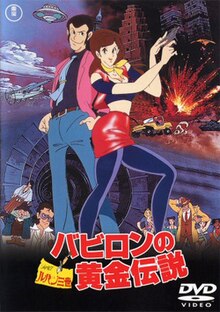Legend of the Gold of Babylon
| Lupin III: Legend of the Gold of Babylon | |
|---|---|

Japanese DVD Cover
|
|
| Directed by |
Seijun Suzuki Shigetsugu Yoshida |
| Produced by | Tetsuo Katayama Kazushichi Sano Hidehiko Takei |
| Screenplay by | Yoshio Urasawa Atsushi Yamatoya |
| Based on |
Lupin III by Monkey Punch |
| Starring |
Yasuo Yamada Kiyoshi Kobayashi Eiko Masuyama Makio Inoue Gorō Naya |
| Music by | Yuji Ohno |
| Cinematography | Hajime Hasegawa |
| Edited by | Masatoshi Tsurubuchi |
|
Production
company |
|
| Distributed by | Toho |
|
Release date
|
|
|
Running time
|
100 minutes |
| Country | Japan |
| Language | Japanese |
Lupin III: Legend of the Gold of Babylon (Japanese: ルパン三世 バビロンの黄金伝説 Hepburn: Rupan sansei: Babiron no Ōgon Densetsu?) is a 1985 Japanese animated film co-directed by Seijun Suzuki and Shigetsugu Yoshida. It is the third feature film based on Monkey Punch's popular Lupin III manga.
It was released on subtitled VHS and LaserDisc in North America by AnimEigo in 1994 under the "Rupan III" name, due to copyright concerns with Maurice Leblanc's Arsène Lupin.
Lupin searches for a gigantic hoard of hidden treasure originating in ancient Babylon, with the help of his usual team, a set of stone tablets, and a drunken old woman by the name of Rosetta. Complicating matters is Inspector Zenigata, who has been roped into judging the "Miss ICPO Beauty Contest" and must now drag a group of nominees around with him, all eager to prove themselves as agents.
This film is the only Lupin film where he wears the pink jacket from the third TV series. AnimEigo released the film with English subtitles and Japanese dialogue under the title "Rupan III: Legend of the Gold of Babylon" on VHS in the North America in 1995. In 2005, Discotek Media acquired it for a DVD release, however, it was later cancelled due to NA's declining anime industry.
Mike Toole of Anime News Network stated that when he first watched the film in the 1990s, he hated it, having only known Lupin as the "smooth, gallant antihero" from The Castle of Cagliostro and The Plot of the Fuma Clan. Whereas Legend of the Gold of Babylon's version of Lupin is closer to Monkey Punch's original "rough, drunken, lecherous crook." However, a decade later, he stated that the film "goes down much smoother" having been acquainted with Suzuki's other work, the director being known for his bizarre and oddly-structured films.
...
Wikipedia
